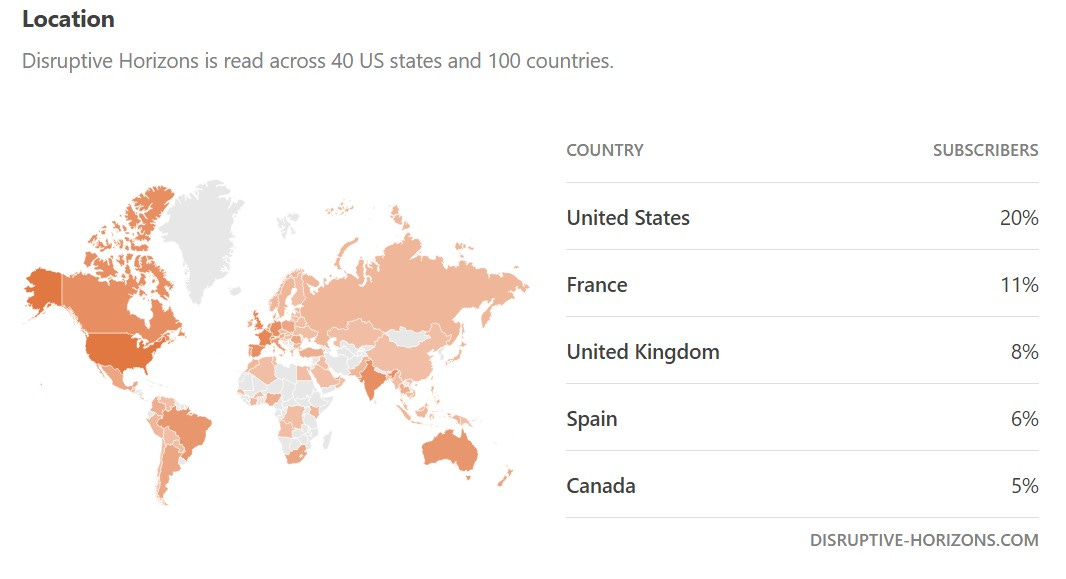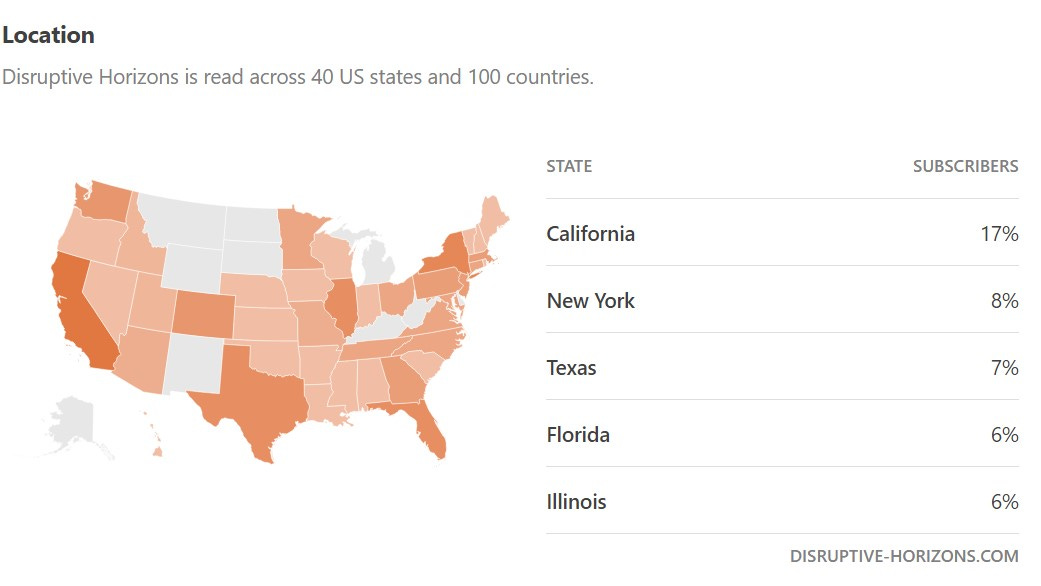Review of Disruptive Horizons in 2023
The first 6 months
I started this blog in June 2023, so as the end of the year approaches, it's time to make a first review.
First of all, as I explained in the first article, my two main goals in creating this blog are 1) to put my ideas in the "boxing ring of ideas" in order to get feedback and constructive criticism, so that the book's content is "battle tested" before its release and 2) to start building an audience in English, to prepare for the book's release in English, and also because the community of people interested in Disruptive Horizons' topics is much larger in English than in French.
On these two points, I am very pleased with the results already achieved:
Feedback and constructive criticism
While I'd love to get more feedback directly on the blog, I've received a lot of feedback on forums, notably on Telegram and Discord from libertarians, crypto-guys, and others interested in alternative governance models.
In particular, a pseudonymous person from a group dedicated to SeaSteading gave me some excellent constructive criticism on my two articles on the 10 historical principles for predicting the future, which led me to make a few updates.
This is particularly important because I see these principles as axioms, solid enough for me to draw conclusions about the major trends that will emerge in the future, and I use them throughout my book.
Thanks to this anonymous person, who has since unfortunately deleted his account in the group. If you recognizes yourself, don't hesitate to comment, I'd love to continue our dialogue :)
Note: Given my aim to perfect the content of my book before publication, none of the articles already published are immune to major updates. So far, I've made many minor updates, but not yet major ones, on many articles.
Readers who have been subscribers for a while can play the 7 errors game and compare the article they received by email (frozen in time) with the one published on the site (probably updated).
Some examples of principle updates:
1st principle
Original: The power of governments is based on the immobility of their subjects.
And when a population tends to escape their control and thus diminish their tax base, many governments are tempted to re-establish control by tying this population to their territory, by various means, including the most extreme. These means always reduce the freedom of their subjects.Update: The power of governments is based on the immobility of their subjects.
And when a population tends to escape their control and thus diminish their tax base and workforce, many governments are tempted to re-establish control by tying this population to their territory, by various means, including the most extreme. These means always reduce the freedom of their subjects.
3rd principle
Original: When a cheap, hard-to-censor communications technology develops, the authorities in power try to control it and institute mechanisms to tell "good believers" what is true and what is not.
Update: When a cheap, hard-to-censor communications technology develops and starts spreading points that run counter to that of the authorities, the authorities in power try to control it and institute mechanisms to tell "good believers" what is true and what is not.
These updates are representative of the others I've put in place: you can see that they're relatively minor, and are of the order of clarifying the context and scope of the ideas, to take account in particular of certain edge cases put forward by this person.
An apparent contradiction in research
I also participate regularly in various discussion groups that revolve around the same topics as this blog, also in the hope of perfecting my knowledge and skills, and being challenged.
This is exactly what happened in a discussion group focused on the Network States concept popularized by Balaji: a few weeks ago, I began discussing the themes I address in the article The Worst Moment: The Growing Difficulty Of Nation-States To Raise Taxes, which at the time had not yet been published on this blog.
This article, like all the others on this blog (except news articles like this one), is from my book, and at the time of this discussion, it only included data showing a drop in the top marginal income tax rate, and the average corporate tax rate, data I shared in a discussion.
That's when Antoine Dusséaux challenged me by sharing data which showed that the average tax rate had risen, as had the weight of corporate tax revenues in relation to GDP, in OECD countries.
This contradiction between seemingly decreasing taxes and increasing deductions stopped me right in my tracks, and led me to take a break for the first time since the start of this blog: whereas from June to the end of October, I managed to keep up the pace of one article a week, largely because they were all already written in my book, I had to take a break for a few weeks, while I did the necessary research to resolve this contradiction (I even directly contacted the lead author of one of the major research articles on the subject), which in the end is not a contradiction at all.
It's all explained in
if you're interested.
Audience development
Traffic continues to grow, with nearly 8,000 visits in the last 30 days, and nearly 2,000 of you following this blog regularly, so I'm happy with the results for a blog started 6 months ago :)
These results represent the last 30 days, during which 2 articles were published :
What's more, as you can see, 5 of you have already promised to pay me as soon as I activate paid subscriptions1, which I think is cool, given that I haven't currently made any call to action anywhere to get paid subscribers, and that I haven't put any of my articles behind a paywall: you really have to want it to find the button to make such a promise, so thanks to you 5 :)
For the moment, putting articles behind paywalls isn't compatible with the two main objectives I've shared above, so I don't aim to do it in the short or even medium term, although I'll reserve this option for later if I feel it becomes interesting.
Because the two priorities are to obtain quality feedback, and to develop the English-speaking audience before the publication of the book.
Which brings me to my next topic:
Where do you follow Disruptive Horizons from?
I'm used to having an audience following me mainly from French-speaking countries with my usual content, so I'm delighted to see the geographical diversity of the countries you're in: 100 countries and 40 American states.
The country from which you follow me most is the United States, and the second is France. I haven't told my French-speaking audience about this blog though, and only the most motivated can stumble upon it, either by doing a Google search, or by following a series of links starting from a (very) small part of my French-language content, so congratulations on finding the blog ;).
As for the U.S. states, California is the 1st state represented (no surprise given that it is the most populous U.S. state) and New York (4th most populous state), closely followed by Texas and Florida (2nd and 3rd most populous state).
So New York is slightly over-represented relative to its size, but we're within a close enough range that it probably doesn't mean much.
Most popular and underrated content in 2023
The 3 most popular articles
This article has been widely shared on Linkedin, notably in discussion groups dedicated to KYC and AML, where it has generated a lot of controversy, and also via personalities like Ertan Can (thanks Ertan for sharing my article to your audience !).
I'm glad this article is popular, as the principles I share in it, as well as in the 2nd article, are the ones I rely on throughout my book to make predictions about major trends in the future of nation-states.
This article has been widely shared on Facebook
The 3 most underrated ones
This is one of the least-read articles on the blog, and yet I think it's one of the best.
It's doesn’t concern Americans, but they only represent 20% of this blog's audience.
So maybe it's because you readers don't ask yourselves whether your country can decide to tax you on your nationality, as the US does?
Maybe it's because it was one of the first articles published and went unnoticed?
It's pretty crazy, but part 1 of this article is one of the most popular on the blog, while part 2 is one of the least popular.
Guys, this article is in two parts! Read the second if you liked the first ;)
Another little-read article, and one of which I'm rather proud, since it shows that nation-states are also being disrupted in a function that is absolutely vital to them: tax collection.
In the end
At the moment, just under 400 people subscribe to Disruptive Horizons every month, which is good for such a young blog, but also a little frustrating for me (my content in French generates more than 10 times this number of monthly subscribers).
This is partly due to the fact that I'm doing this alongside my internet business, which I have to manage, even though I devote only around twenty hours a week to it (it's a 4-hour week type lifestyle business), and above all my book, which forms the basis of this blog, and takes up an enormous amount of my time researching, not to mention writing.
Audience development is on the right track, however, and I'd like to thank the few Substackers who are already recommending my blog, including Tomas Pueyo of Uncharted Territories, and Niklas Anzinger of Stranded Technologies, thank you!
I'd also like to thank all the valiant pioneers who are following this blog, which is just emerging from the egg : thank you for your support!
If you enjoy the content I share on Disruptive Horizons, you can choose one of these to help me keep going :
Follow Disruptive Horizons on Twitter to help me spread the ideas and concepts shared on this blog.
Follow me on my Linkedin in English, for the same reasons
Share the blog or one of its articles with someone you know who might be interested :
That's all there is to it! Thanks if you do, and count on me to continue to regularly share my content on the Internet's disruption of nation-states, and how to transform from a Mono-Country to a Netizen Without Borders throughout 2024 :)
Including 1 literally while I was writing this article, which forced me to update the screenshot and this passage, thank you for your enthusiasm, ah ah :)








